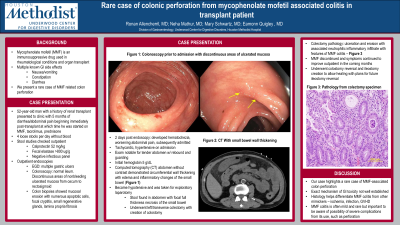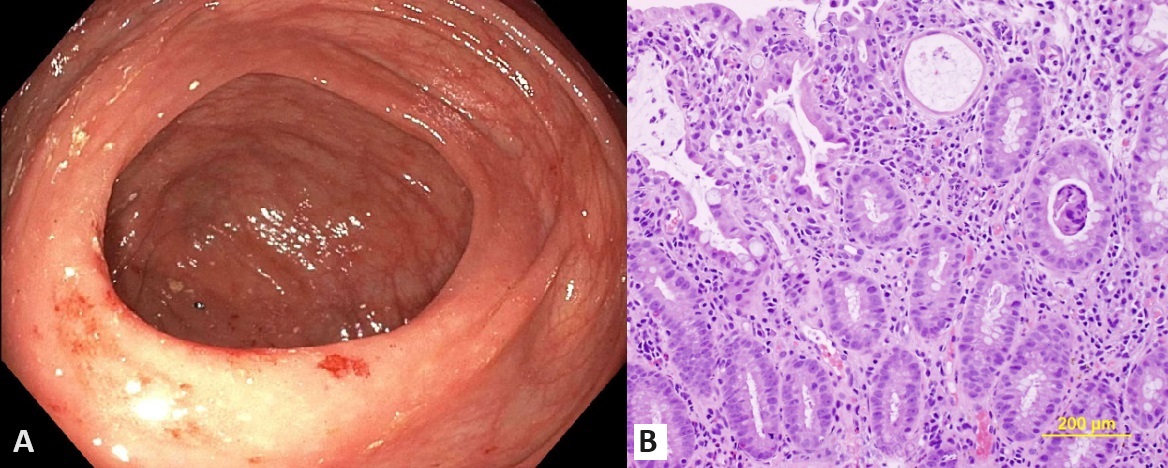Tuesday Poster Session
Category: Colon
P3785 - Rare Case of Colonic Perforation From Mycophenolate Mofetil Associated Colitis in Transplant Patient
Tuesday, October 29, 2024
10:30 AM - 4:00 PM ET
Location: Exhibit Hall E

Has Audio

Ronan Allencherril, MD
Houston Methodist
Houston, TX
Presenting Author(s)
Ronan Allencherril, MD1, Neha Mathur, MD1, Mary R. Schwartz, MD1, Eamonn Quigley, MD2
1Houston Methodist, Houston, TX; 2Houston Methodist Hospital, Houston, TX
Introduction: Mycophenolate mofetil (MMF) is an immunosuppressive drug used in rheumatological conditions and post organ transplantation. Gastrointestinal side effects, including nausea, vomiting, constipation, and diarrhea have been well documented. We report a unique case of a severe adverse reaction to MMF resulting in colon perforation.
Case Description/Methods: A 52-year-old male with a history of renal transplantation presented to clinic with a 5-month history of diarrhea and abdominal pain that began just days after transplant . He reported diarrhea 4 times per day without blood. Post transplant, patient was started on tacrolimus, MMF and prednisone, with which he had been compliant. Stool studies showed a calprotectin of 52 mg/kg, fecal elastase >800 ug/g, and a negative infectious panel. Patient proceeded to EGD and colonoscopy. EGD showed multiple gastric erosions in the body and antrum and three pre-pyloric ulcers. Colonoscopy showed a normal ileum and discontinuous areas of nonbleeding ulcerated mucosa from the cecum to the rectosigmoid colon (Figure 1a). Colon biopsies showed mucosal erosion with numerous apoptotic cells, focal cryptitis, small regenerative glands, and lamina propria fibrosis (Figure 1b). Two days later, he developed worsening abdominal pain, hematochezia, prompting admission. He was hypertensive and tachycardic, with a diffusely tender abdomen with rebound and guarding. Hemoglobin was 5 g/dL. Computed tomography of the abdomen showed circumferential wall thickening with edema and inflammatory changes of the small bowel. He became hypotensive and was taken for an exploratory laparotomy, which found stool in the abdomen with focal full thickness necrosis of the transverse colon. A left/transverse colectomy with a colostomy was performed. Colectomy pathology showed areas of ulceration and erosion with associated neutrophilic inflammatory infiltrate together with features of MMF colitis. MMF was discontinued and his symptoms continued to improve post discharge.
Discussion: MMF associated colon perforations are extremely rare with only few reports in the literature. Bowel perforation in post renal transplant patients has been reported most frequently in the colon but can occur in the small bowel and the stomach as well. The mechanism is MMF toxicity is unknown but thought secondary to direct mucosal toxicity or alterations in the gut microbiome. Although MMF induced colitis can be mild, it is important to be aware of the possibility of severe complications from its use.

Disclosures:
Ronan Allencherril, MD1, Neha Mathur, MD1, Mary R. Schwartz, MD1, Eamonn Quigley, MD2. P3785 - Rare Case of Colonic Perforation From Mycophenolate Mofetil Associated Colitis in Transplant Patient, ACG 2024 Annual Scientific Meeting Abstracts. Philadelphia, PA: American College of Gastroenterology.
1Houston Methodist, Houston, TX; 2Houston Methodist Hospital, Houston, TX
Introduction: Mycophenolate mofetil (MMF) is an immunosuppressive drug used in rheumatological conditions and post organ transplantation. Gastrointestinal side effects, including nausea, vomiting, constipation, and diarrhea have been well documented. We report a unique case of a severe adverse reaction to MMF resulting in colon perforation.
Case Description/Methods: A 52-year-old male with a history of renal transplantation presented to clinic with a 5-month history of diarrhea and abdominal pain that began just days after transplant . He reported diarrhea 4 times per day without blood. Post transplant, patient was started on tacrolimus, MMF and prednisone, with which he had been compliant. Stool studies showed a calprotectin of 52 mg/kg, fecal elastase >800 ug/g, and a negative infectious panel. Patient proceeded to EGD and colonoscopy. EGD showed multiple gastric erosions in the body and antrum and three pre-pyloric ulcers. Colonoscopy showed a normal ileum and discontinuous areas of nonbleeding ulcerated mucosa from the cecum to the rectosigmoid colon (Figure 1a). Colon biopsies showed mucosal erosion with numerous apoptotic cells, focal cryptitis, small regenerative glands, and lamina propria fibrosis (Figure 1b). Two days later, he developed worsening abdominal pain, hematochezia, prompting admission. He was hypertensive and tachycardic, with a diffusely tender abdomen with rebound and guarding. Hemoglobin was 5 g/dL. Computed tomography of the abdomen showed circumferential wall thickening with edema and inflammatory changes of the small bowel. He became hypotensive and was taken for an exploratory laparotomy, which found stool in the abdomen with focal full thickness necrosis of the transverse colon. A left/transverse colectomy with a colostomy was performed. Colectomy pathology showed areas of ulceration and erosion with associated neutrophilic inflammatory infiltrate together with features of MMF colitis. MMF was discontinued and his symptoms continued to improve post discharge.
Discussion: MMF associated colon perforations are extremely rare with only few reports in the literature. Bowel perforation in post renal transplant patients has been reported most frequently in the colon but can occur in the small bowel and the stomach as well. The mechanism is MMF toxicity is unknown but thought secondary to direct mucosal toxicity or alterations in the gut microbiome. Although MMF induced colitis can be mild, it is important to be aware of the possibility of severe complications from its use.

Figure: Figure 1a: Ulcerated mucosa by the ileocecal valve during colonoscopy. 1b: pathology specimen from the random colon biopsies showing damaged crypts
Disclosures:
Ronan Allencherril indicated no relevant financial relationships.
Neha Mathur: Ardrelyx – Advisory Committee/Board Member. Sanofi and Regeneron – Advisory Committee/Board Member, Speakers Bureau.
Mary Schwartz indicated no relevant financial relationships.
Eamonn Quigley: Atmo Biosciences – Advisor or Review Panel Member, Consultant, Grant/Research Support. Cindome – Grant/Research Support. Food Marble – Consultant. Nimble – Consultant. Novozymes – Consultant. Takeda – Grant/Research Support. Vibrant – Advisor or Review Panel Member, Consultant, Grant/Research Support. Vibrant Advisory Board – Advisory Committee/Board Member.
Ronan Allencherril, MD1, Neha Mathur, MD1, Mary R. Schwartz, MD1, Eamonn Quigley, MD2. P3785 - Rare Case of Colonic Perforation From Mycophenolate Mofetil Associated Colitis in Transplant Patient, ACG 2024 Annual Scientific Meeting Abstracts. Philadelphia, PA: American College of Gastroenterology.
